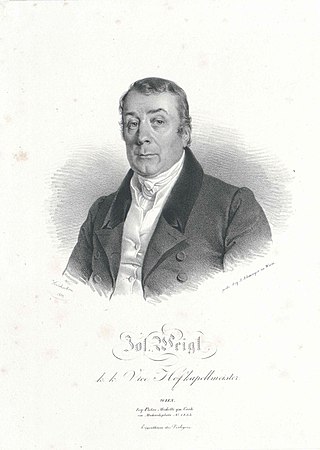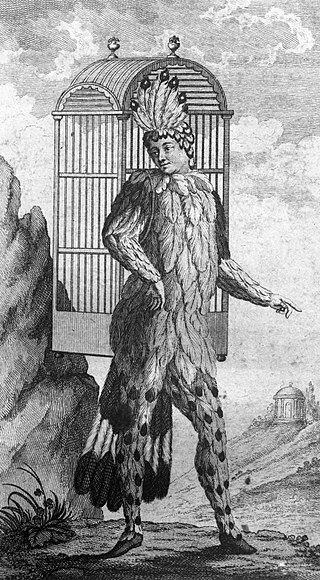Related Research Articles

Joseph Weigl was an Austrian composer and conductor, born in Eisenstadt, Hungary, Austrian Empire.

Emanuel Schikaneder was a German impresario, dramatist, actor, singer, and composer. He wrote the libretto of Wolfgang Amadeus Mozart's opera The Magic Flute and was the builder of the Theater an der Wien. Peter Branscombe called him "one of the most talented theatre men of his era". Aside from Mozart, he worked with Salieri, Haydn and Beethoven.
Posse mit Gesang is a form of popular German-language music drama, that developed in the late 18th and early 19th centuries. Early examples are sometimes called Possenspil or Possenspiel. It is also sometimes referred to simply as Posse (farce).

The Theater in der Leopoldstadt was an opera house in the Leopoldstadt district of Vienna, founded in 1781 by Karl von Marinelli, following the Schauspielfreiheit by Joseph II in 1776. The 19th-century summer stage called the Thaliatheater was also managed by the Leopoldstadt.

Louis Jean Jacques Angely was a German playwright, actor and director, who wrote Possen (farces) and vaudeville after French models, adapted for German audiences.

Carl Wilhelm August Blum was a German singer, librettist, stage actor, director, guitarist and opera and song composer. Philip J. Bone wrote that Blum was "a universal genius, uniting in one person the poet, the dramatist, composer, singer and performer." He was composer to the Court of the King of Prussia.

Deutsche Wanderbühne is the term for roving German-speaking, theatrical troupes or travelling operas, consisting of professional actors and musicians. They were financially independent but did not have their own fixed stage.
Carl Ignaz Anton Demmer, also Karl, was an operatic tenor at the Vienna court opera, and possibly Florestan in the first version of Beethoven's opera Fidelio on 20 November 1805, then titled Leonore, oder Der Triumph der ehelichen Liebe.
Karl Theodor Haßloch was a German stage actor and operatic tenor, bass and bariton, composer, Kapellmeister, Opera director, theater director and librettist.

Karl Haffner (pseudonym), real name Karl Schlechter, was a German dramaturge.
Michael Hebenstreit was an Austrian Kapellmeister and composer for stage music.
Johann Peter Ritter was a German composer, conductor, chorus master, and cellist born and died in Mannheim, Karlsruhe, Baden-Württemberg, Germany). He is best known in the United States for "Sun of My Soul" and "Holy God, We Praise Thy Name."
Friedrich Ernst Hopp was an Austrian actor and writer.
Johann Heinrich Friedrich Müller was a German actor, writer and Singspiel poet.

Gottlob Benedict Bierey was a German composer, Kapellmeister and Theatre tenant.
Elise (Sara) Henle Levi was a German Jewish writer, dramatist, and poet. She was the author of numerous dramatic comedies, opera libretti, poems, and cookbooks.

Carl Balthasar Malß was a German poet, architect and theatre director.
Semele is a singspiel libretto by Friedrich Schiller, first published in the Musen-Almanach Anthologie auf das Jahr 1782. Schiller edited a pirated edition in 1800, but decided not to republish it. After his death, his friend and patron Christian Gottfried Körner published the revised edition in the fifth volume of the series Theater von Schiller, published by Cotta-Verlag.

Jean de Paris is an opéra comique in two acts by French composer François-Adrien Boieldieu and librettist Claude Godard d'Aucourt de Saint-Just.
Friedrich Tietz sometimes incorrectly called Friedrich von Tietz, was a German theatre director, publicist and writer.
References
- 1 2 Joseph Kürschner (1880). "Herklots: Karl Alexander Herklots, Theaterdichter, geb. am ..." Allgemeine Deutsche Biographie . Duncker & Humblot, Leipzig & Bayerische Staatsbibliothek, München. p. 115. Retrieved 6 February 2016.
- 1 2 Karl Goedeke; Edmund Goetze, eds. (1893). "Karl Alexander Herklots". Sechstes Buch: Vom siebenjährigen bis zum Weltkriege: Nationale Dichtung ... Grundriss zur Geschichte der Deutschen Dichtung. Vol. 5. Akademie Verlag, Berlin (2011 re-issue). p. 398. ISBN 978-3-05-005224-3.
- ↑ Rudolph Angermüller; Hartmut Krones (producer) (2009). "Spielpan des Leopoldstädter Theaters 1781 bis 1830 (footnote 315)". Wenzel Müller und "sein" Leopoldstädter Theater: mit besonderer Berücksichtigung der Tagebücher Wenzel Müllers. Boehlau Verlag, Wien. p. 97. ISBN 978-3-205-78448-7.